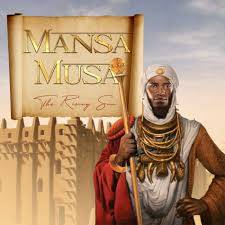Mansa Musa: The Wealthiest King in History
Mansa Musa, the 14th-century emperor of the Mali Empire, is widely regarded as the richest individual in recorded history. His reign, which lasted from 1312 to 1337, marked a golden age for Mali, during which the empire flourished economically, culturally, and religiously. Mansa Musa's story is not only one of immense wealth but also of vision, leadership, and the spread of Islamic culture in West Africa.
Mansa Musa is said to be even richer than Elon Musk . His wealth no man has surpassed it. The greatest in History.
Born around 1280, Musa I ascended to the throne under unusual circumstances. His predecessor, Abu Bakr II, reportedly embarked on an ambitious expedition to explore the Atlantic Ocean and never returned. Musa, who had been serving as his deputy, took over as emperor and quickly established himself as a powerful and devout Muslim ruler. The Mali Empire under his rule became one of the largest and wealthiest empires in African history.
The wealth of Mansa Musa primarily stemmed from Mali’s abundant natural resources, especially gold. At the time, Mali controlled the majority of the gold supply in the Old World, and Musa managed these resources with great skill. Mali’s economy was further bolstered by its control of trade routes that connected West Africa to North Africa, Europe, and the Middle East. Caravans laden with gold, ivory, salt, and other goods regularly passed through cities like Timbuktu and Gao, making Mali a key hub of commerce and culture.
Mansa Musa gained global fame through his pilgrimage to Mecca in 1324, a journey that remains legendary. He traveled with a caravan reportedly consisting of 60,000 men, including 12,000 slaves, and carried vast amounts of gold—so much, in fact, that he disrupted local economies along the way. In Cairo, his generous distribution of gold caused significant inflation that took years to stabilize. The extravagance of his pilgrimage caught the attention of the wider Muslim world and Europe, placing Mali firmly on the map.
This pilgrimage was not just a religious duty; it was also a diplomatic mission. Mansa Musa established relationships with rulers and scholars in Egypt and the Middle East. He brought back architects, artists, and Islamic scholars to Mali, laying the foundation for a cultural and intellectual renaissance. One of the most famous individuals he recruited was the Andalusian architect Abu Ishaq al-Sahili, who helped design several grand buildings, including the Djinguereber Mosque in Timbuktu.
Under Mansa Musa, Timbuktu became a center of Islamic learning. The city housed numerous schools, libraries, and mosques, most notably the University of Sankore, which attracted students and scholars from across the Islamic world. This intellectual growth elevated Mali’s status not only as a commercial power but also as a cultural beacon.
Despite his immense wealth and influence, Mansa Musa ruled with a sense of justice and religious devotion. Islamic law played a significant role in governance, and Musa is remembered for promoting education and religious tolerance. His leadership helped unify a vast and diverse empire that spanned modern-day Mali, Senegal, Gambia, Guinea, Niger, Nigeria, Chad, and Mauritania.
Mansa Musa died in 1337, leaving behind a legacy of prosperity, education, and cultural achievement. While his successors struggled to maintain the empire’s strength, Musa's reign remains a symbol of African excellence and historical greatness. His name continues to inspire discussions about wealth, leadership, and the importance of cultural heritage.
In conclusion, Mansa Musa was not just the wealthiest man in history—he was a visionary leader who used his fortune to foster development, education, and faith. His story challenges common perceptions of African history and highlights the continent's rich and complex past. Mansa Musa's legacy lives on, reminding the world of the powerful empires that once flourished in West Africa.




No comments yet
Be the first to share your thoughts!